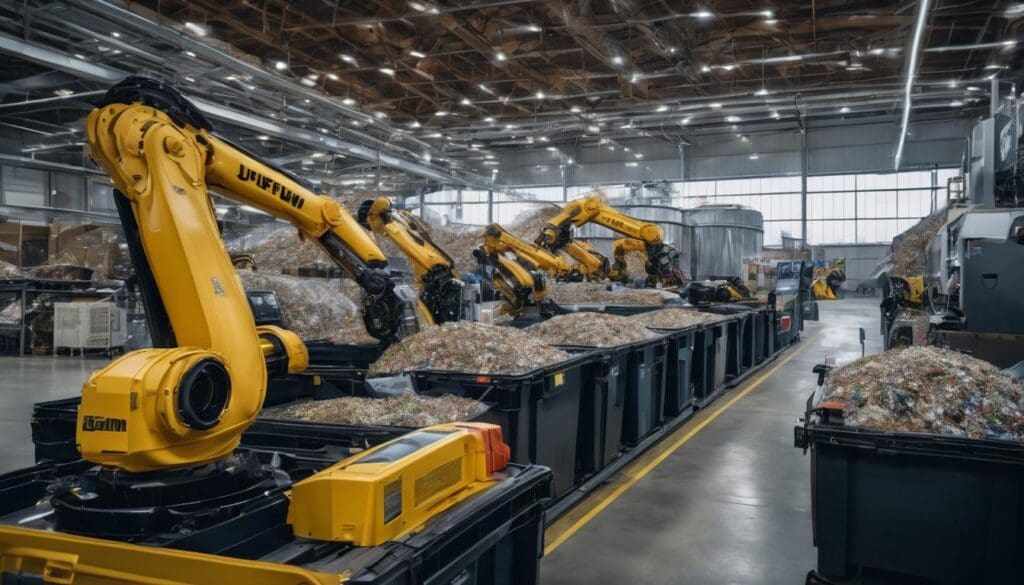Recycling, often seen as a mundane task of sorting through yesterdays waste, is undergoing a radical transformation. As someone who has delved into the intricacies of environmental technology for years, I’ve witnessed firsthand how artificial intelligence (AI) and innovative materials are revolutionising this essential process.
Traditional methods are being outpaced by smart solutions that promise to address the mounting challenges faced by our planet.
Incorporating AI into recycling is like introducing a master chess player into a novice tournament – the game changes completely. The industry now stands on the cusp of an efficiency revolution; robotic arms and intelligent systems can sort recyclables with astonishing accuracy and speed.
With this article, I’ll guide you through how these advancements not only improve recycling rates but also forge a sustainable pathway for future generations. Get ready to explore how tomorrow’s rubbish will be handled with today’s cutting-edge technology!
Key Takeaways
- AI – powered sorting in the recycling industry introduces increased efficiency and accuracy, leading to enhanced waste management and reduced environmental impact.
- Revolutionary robotic systems equipped with AI are transforming waste sorting by performing intricate tasks with precision, optimising material recovery and reducing landfill contributions.
- The adoption of innovative materials in the recycling process allows for a broader range of recyclable items, contributing to cost savings and supporting the development of a circular economy.
- Advanced demand forecasting and supply chain optimisation driven by AI ensure more efficient use of resources within the recycling industry.
- Traceability measures provided by artificial intelligence enhance accountability in recycling processes, promoting sustainable practices across the sector.
Automated Sorting with AI
The recycling industry faces challenges with manual waste sorting and contamination. However, AI-powered sorting offers advantages such as increased efficiency and accuracy in waste management.
Challenges in recycling industry
Sorting waste correctly poses a significant challenge in the recycling industry. Different materials often get mixed up, contaminating the recyclable batches and making them unusable for creating new products.
Contamination can drastically reduce the quality and value of recycled material, leading to increased costs and lower efficiency.
Recycling facilities also face difficulties due to the vast variety of packaging materials on the market. Identifying and separating these diverse materials requires advanced technology that not all plants have access to.
Workers at these sites must handle hazardous waste, which adds a layer of complexity regarding health and safety protocols. Additionally, public confusion about recycling rules adds more non-recyclable items into bins meant for recyclables, further complicating sorting processes at recycling centres.
Advantages of AI-powered sorting
- Enhanced accuracy and efficiency in waste sorting, leading to improved recycling rates and reduction in contamination.
- Reduction of manual labour, as AI-driven machines can perform repetitive tasks with precision and speed.
- Optimisation of waste separation through advanced algorithms, resulting in increased recovery of valuable materials.
- Minimisation of waste sent to landfills, contributing to a more sustainable environment and circular economy.
- Improved safety for workers by automating hazardous or difficult sorting tasks using AI-guided robotic systems.
- Cost savings for recycling facilities through reduced labour costs and increased operational efficiency.
- Creation of new opportunities for converting non – recyclable waste into renewable energy sources and innovative products.
Revolutionising Waste Management with AI
AI-guided robotic systems are transforming waste management by efficiently sorting and detecting contamination in recyclable materials. This innovative technology is revolutionising the recycling industry and paving the way for more sustainable waste management solutions.
AI-guided robotic systems
AI-guided robotic systems are revolutionising waste management by improving the accuracy of automated sorting in recycling facilities. These robots, powered by artificial intelligence, use advanced computer vision algorithms to identify and sort different types of materials with precision.
This technology helps divert recyclable materials away from landfills, contributing to increased efficiency and effectiveness in recycling processes. By taking over the challenging task of waste sorting, AI-driven machines also alleviate the need for manual labour in recycling facilities.
Furthermore, AI-guided robotic systems play a crucial role in streamlining the collection of non-recyclable waste for conversion into renewable products, energy, and fuel. With their ability to perform intricate sorting tasks that may be less appealing or difficult for humans to execute consistently, these systems are at the forefront of modern recycling technology – shaping the future landscape of sustainable materials sorting and waste reduction.
Waste sorting and contamination detection
AI-guided robotic systems are leading the way in waste sorting and contamination detection, enhancing the accuracy of recycling processes. Through advanced computer vision and robotics, materials can be precisely identified and sorted, reducing the risk of contamination in recycled products.
This technology enables waste management facilities to divert more materials away from landfills and towards recycling streams, contributing to a significant reduction in environmental impact.
Precision waste sorting powered by AI not only increases the efficiency of recycling operations but also helps to ensure that recyclable materials remain free from contaminants, thereby improving the quality of recycled products.
Innovative Materials in Recycling
The future of recycling also involves the revolutionisation of materials such as plastic, with advancements in AI-powered sorting and recycling processes making it possible to recycle a wider range of materials.
In addition, the construction industry is also exploring AI-powered recycling for innovative building materials.
Plastic recycling revolution
Plastic recycling is undergoing a revolution, driven by the application of AI-powered sorting and innovative materials. With advanced recycling technology, precision waste sorting systems, and next-generation waste sorting algorithms, the efficiency of plastic recycling is being significantly enhanced.
This allows for more accurate picking and sorting of plastic waste, diverting it away from landfills and contributing to a more sustainable circular economy. The use of AI in plastic recycling not only increases the amount of waste properly recycled but also reduces the amount sent to landfills, aligning with environmentally conscious efforts to support conservation.
AI-powered recycling in construction industry
AI-powered recycling in construction industry
AI-powered recycling in the construction industry is revolutionising waste management. With advanced computer vision and robotics, materials identification and sorting are more accurate than ever.
This innovation enables precise sorting of materials, diverting them away from landfills and contributing to sustainable construction practices.
Additionally, AI-guided robots are enhancing the accuracy of automatic sorting of recycled materials in construction waste. These systems not only improve recycling efficiency but also support the reduction of waste sent to landfills.
The use of AI technology in the construction industry ensures that a significant amount of recyclable material can be redirected into valuable resources rather than being discarded as waste.
Benefits of AI-Powered Recycling
– AI-powered recycling offers increased efficiency and accuracy in waste sorting, resulting in reduced contamination and higher quality recycled materials. It also leads to significant reduction of waste in landfills, contributing to a more sustainable environment.
Increased efficiency and accuracy
AI-powered sorting technologies offer increased efficiency and accuracy in waste management, leading to more precise sorting of recyclable materials. These advanced systems use next-generation waste sorting algorithms and AI-guided robotic systems to streamline the recycling process.
The result is a significant reduction of waste sent to landfills and an increase in the amount of materials properly recycled, contributing to a more sustainable and environmentally friendly approach to waste management.
By leveraging artificial intelligence in waste sorting facilities, the industry is witnessing a transformation towards smart sorting systems that ensure optimal resource recovery. With AI-driven machines performing the intricate task of material separation more accurately than ever before, there is potential for substantial energy conversion from non-recyclable waste into renewable products, energy, and fuel.
Reduction of waste in landfills
AI-powered waste sorting and innovative materials are pivotal in reducing the amount of waste ending up in landfills. Through precise sorting, these technologies ensure that more materials are diverted away from landfills and into the recycling stream.
This not only reduces the environmental burden of landfills but also contributes to a more sustainable approach to waste management, aligning with the goals of environmentally conscious individuals who support conservation and green technology.
Innovative materials used in recycling processes, alongside AI-guided robots, have greatly enhanced the accuracy and efficiency of automatic sorting in recycling facilities. As a result, there is an increase in the proper recycling of waste materials while simultaneously decreasing what ends up in landfills.
Cost savings
AI-powered recycling facilities are able to reduce operational costs by automating the sorting process and minimising the need for manual labour. This results in significant cost savings for recycling companies, which can lead to more competitive pricing for recycled materials.
Additionally, AI-guided waste management systems help minimise the amount of waste sent to landfills, ultimately reducing disposal expenses and enabling more efficient use of resources.
With less money spent on handling waste, businesses can allocate funds towards further innovation in sustainable packaging and green technology.
The Future is Smart
AI-powered demand forecasting and supply chain optimisation will revolutionise recycling, ensuring that resources are used efficiently. Additionally, traceability and accountability in recycling processes will be enhanced with the help of AI technology.
AI-powered demand forecasting and supply chain optimisation
AI-powered demand forecasting and supply chain optimisation are revolutionising the recycling industry. With the application of AI technology, companies can accurately predict future demand for recycled materials, allowing them to optimise their supply chain and reduce waste.
This not only saves costs but also minimises the environmental impact by ensuring that only necessary resources are used in the recycling process.
The integration of AI in demand forecasting and supply chain optimisation enables recycling facilities to operate more efficiently, saving time and reducing unnecessary energy consumption.
Traceability and accountability in recycling
With the integration of AI-powered demand forecasting and supply chain optimisation, recycling processes are also becoming more transparent and accountable. This is achieved through the use of tracking systems that allow for the identification and tracing of recycled materials throughout their lifecycle.
These systems ensure that materials are properly sorted and processed, enabling accountability at every stage of the recycling process.
Moreover, AI technology enables the implementation of traceability measures to monitor where materials originate from, how they are used in manufacturing processes, and ultimately how they are disposed of or reused.
Conclusion
In conclusion, the future of recycling is bright with AI-powered sorting and innovative materials. This technological advancement offers increased efficiency and accuracy in waste management.
It also plays a critical role in reducing the amount of waste sent to landfills, resulting in cost savings and environmental benefits. The integration of AI technology into recycling processes will undoubtedly lead to a more sustainable and eco-friendly approach to waste management.
FAQs
1. What is AI-powered sorting in recycling?
AI-powered sorting uses artificial intelligence and robotics to create efficient waste sorting systems that can quickly separate recyclables from trash.
2. How does automated waste sorting help the environment?
Automated waste sorting helps the environment by using next-generation waste sorting algorithms to recycle more materials accurately and reduce the amount of waste sent to landfills.
3. Can robots really sort our recycling better than humans?
Yes, robots equipped with artificial intelligence in waste management can sort recycling faster and more accurately than humans, improving overall efficiency in recycling plants.
4. Are there new materials that make recycling easier?
Environmental innovation has led to the development of innovative materials designed for easier and more effective recycling processes, improving how we manage and reuse resources.





